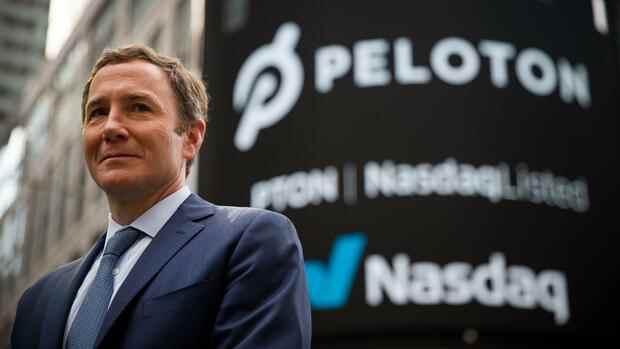The head of the fitness bike manufacturer has recently had to practice crisis communication.
(Photo: Bloomberg)
new York In recent years, the 51-year-old founder and CEO of Peloton has really only known growth. John Foley has been able to more than double the sales of the New York luxury fitness equipment manufacturer in the past three financial years – most recently to more than four billion dollars.
But this week, crisis communication was the order of the day: After the television network CNBC reported that Peloton intends to pause its production of stationary bikes and treadmills for several weeks, the share price fell by almost 24 percent – well below the IPO price of 27 dollars.
Foley responded with a public memo to his employees: “Rumors that we are stopping all production of bikes and treadmills are false,” he wrote on Friday night.
The information is “incomplete, taken out of context” and does not reflect Peloton’s strategy. Foley said it was known who leaked the confidential information, and the person faced legal action.
Top jobs of the day
Find the best jobs now and
be notified by email.
The share price reacted to the appeasement on Friday with a gain of almost twelve percent.
The market environment is becoming more difficult
But even if individual details are not correct or production is not completely paused, one thing is certain: With the end of the pandemic, the market environment for the corona winner Foley will become more difficult.
When people around the world had to spend their time in their own four walls and the gyms closed their doors, the Peloton model was booming: after all, the expensive, elegant exercise bikes not only allow physical exercise in lockdown, the associated subscription also gives you the opportunity to cycle live with real trainers and with other home athletes to compete.
Training in the living room, company included. Many people were willing to pay $2,000 for the bike and $39 a month for a subscription.
But now the fitness studios are open again, and Omikron hardly deters their customers. Peloton is feeling this in the form of declining demand. At the same time, the company’s costs have risen sharply – partly due to rising material prices, also driven by the unexpectedly rapid growth.
According to media reports, Foley has commissioned McKinsey’s management consultants to look for ways to reduce costs. Because there is one thing Peloton has not managed to do in the record years: to make a profit.
Fatal accident and “Sex & The City” scandal
For Foley, dealing with the bad news is the third test in twelve months: Last April, a six-year-old child died from his parents’ device because he had been pulled under the belt. The Consumer Authority requested a recall, but the Peloton founder and CEO initially refused before admitting his mistake.
In December, the new edition of the successful US TV series “Sex & The City” caused Mr. Big, one of the main characters, to die of a heart attack right at the beginning of the new season after strenuous training on his peloton bike. That also caused the share price to drop by eleven percent.
Foley then had the in-house chief cardiologist explain that Mr. Big’s heart attack was due to his lifestyle – cigars, cocktails, steaks. Peloton even shot its own commercial featuring Mr. Big actor Chris Noth, who gets on his Peloton bike alive and kicking. But the spot didn’t last long: Two women accuse the 67-year-old actor of sexual assault in the past, which is why Peloton no longer broadcasts the spot.
Foley, a keen cyclist himself, founded Peloton in early 2012. He brought many years of management experience with him: The New Yorker with an MBA from Harvard Business School has already worked as CEO of the online invitation platform Evite and as head of online sales at the bookstore chain Barnes & Noble. Peloton is one of the most well-known fitness brands in the world today, with fans including singer Jennifer Lopez, actor Hugh Jackman, US President Joe Biden and athletes Usain Bolt and David Beckham. Some of the trainers have real fan bases.
According to a report in the Wall Street Journal, activist investor Blackwells Capital is now preparing a push to replace Foley. In addition, according to the report, a sale of Peloton to a larger technology or fitness group should be examined. Neither Peloton nor Blackwells commented on the report.
The costs have exploded
However, Foley acknowledges that the pandemic has made planning extremely difficult and the company is having to adjust production. “With the Covid-19 pandemic, we suddenly found ourselves in a situation that occurs every hundred years,” he explained. “And what we expected within the next three years happened within months of 2020 and early 2021.” He did not directly comment on reports of thousands of fitness bikes and treadmills waiting for sale in warehouses and cargo ships. It is also unclear what will become of the Ohio factory that Peloton plans to start up in 2025. Observers hope for more detailed information when Peloton presents quarterly figures on February 8th.
Baird analyst Jonathan Komp writes to clients that Peloton has “built up an inflated belly of corporate expenses” after years of aggressive growth. He estimates that the company added an additional $500 million to $600 million in annual costs that could well be cut. This applies to both shops and staff.
More: Kettler as a growth driver: Trisport CEO Melanie Lauer relies on the German fitness brand
